Republicans Finally Turn on the Minimum Wage!
What do Republicans really think about the minimum wage? Pre-Trump, the standard story you’d get from insiders was that while Republican elites oppose the minimum wage, they have to keep their dissent secret. Why? Because the vast majority of ordinary Republicans staunchly support the minimum wage.
During the Trump era, though, I’ve often heard that Republican elites are sincerely changing their minds. In the past, they paid lip service to the minimum wage to placate the rank-and-file. Now, Republican elites “realize” that the rank-and-file were right all along. The minimum wage, it turns out, is right for the American worker and right for America.
Was this story ever true? I know of no data on covert Republican elite opinion, but pollsters have been measuring the views of ordinary Republicans for decades. The standard story checks out. Here’s what Pew found back in 1995:
Republican support was even higher - and the partisan gap even lower - in 2006:
At this point, you could declare, “No wonder Republican elites finally changed their minds. How could they ever have been so out of touch?”
As Columbo would say, though, “There’s just one thing…”
Namely: The latest data shows that rank-and-file Republicans have, at long last, turned on the minimum wage! A February 2021 Politico poll finds that only 34% of Republicans favor raising the minimum wage to $15, with 59% opposed. Subtracting out the undecided leaves 37% in favor versus 63% opposed. A Pew poll from two months later finds an even stronger result:
A 60 percentage-point partisan divide! Compared to the Nineties and Naughts, the partisan gap on the minimum wage has roughly tripled.
Admittedly, Politico also found that most Republicans still favor raising the minimum wage to $11. Subtracting out the undecided Republicans yields 60% pro, 40% con. For Democrats, though, the breakdown is 90%/10% - a 30 percentage-point gap.
Furthermore, presented with three options - no increase, $11, or $15 - “no increase” is the most popular Republican answer. Subtracting out the undecided, 44% of ordinary Republicans now select “no increase” as their first choice.
What’s going on? Rising polarization is the obvious story. Mutual animosity is so strong that Republicans will oppose archetypal feel-good legislation like the minimum wage because they know that Democrats support it.
Another story, though, is that contrary to much punditry about the rise of populism, the Republican rank-and-file is actually becoming markedly more libertarian. Regular Republicans quickly became very libertarian on Covid. The same is largely true for school choice and wokeness issues as well. Perhaps ordinary Republicans’ disillusion with the minimum wage is cut from the same cloth.
I know all too well that popularity is an awful indicator of truth. Although the intellectual case against the minimum wage is very strong, I severely doubt that my favorite arguments are changing many people’s minds. As I’ve said before:
Most people are too irrational to change their minds on anything important. But most people who change their minds on important issues nevertheless do so irrationally.
Still, I’ll take what I can get. When I saw the latest data on the minimum wage, I was shocked to see how far rank-and-file Republicans have moved. This is a crazy time for Republican elites to move left on the minimum wage. Instead, this is an ideal moment to loudly articulate their long-standing doubts.
P.S. If you want to learn more about not just the minimum wage, but all the main ways government hobbles the labor market, check out my Labor Econ Versus the World.


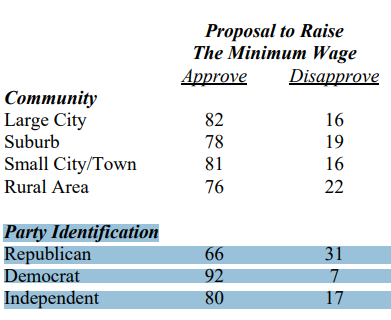
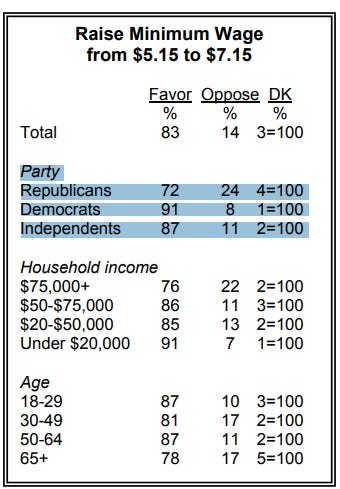
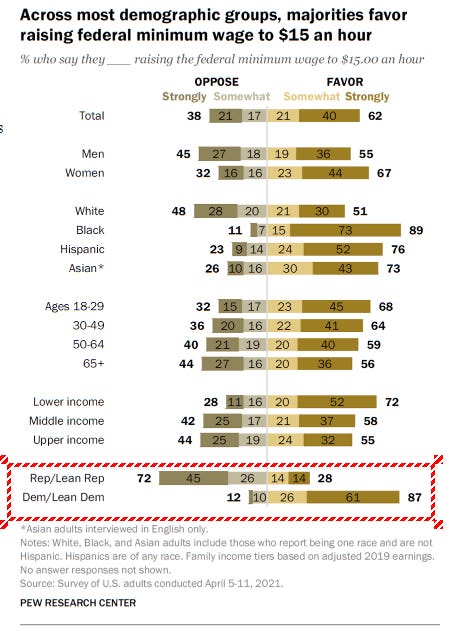
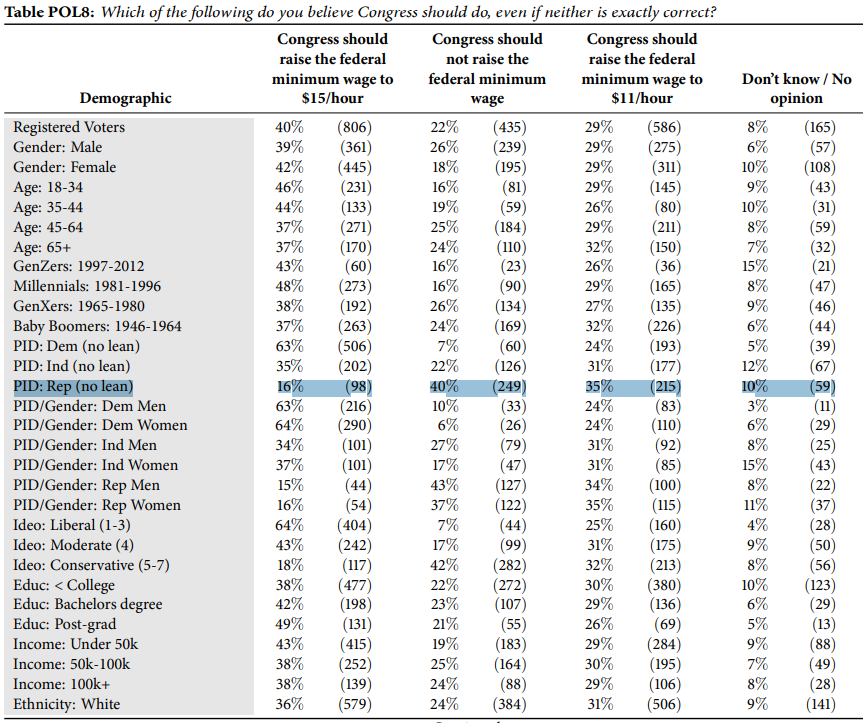
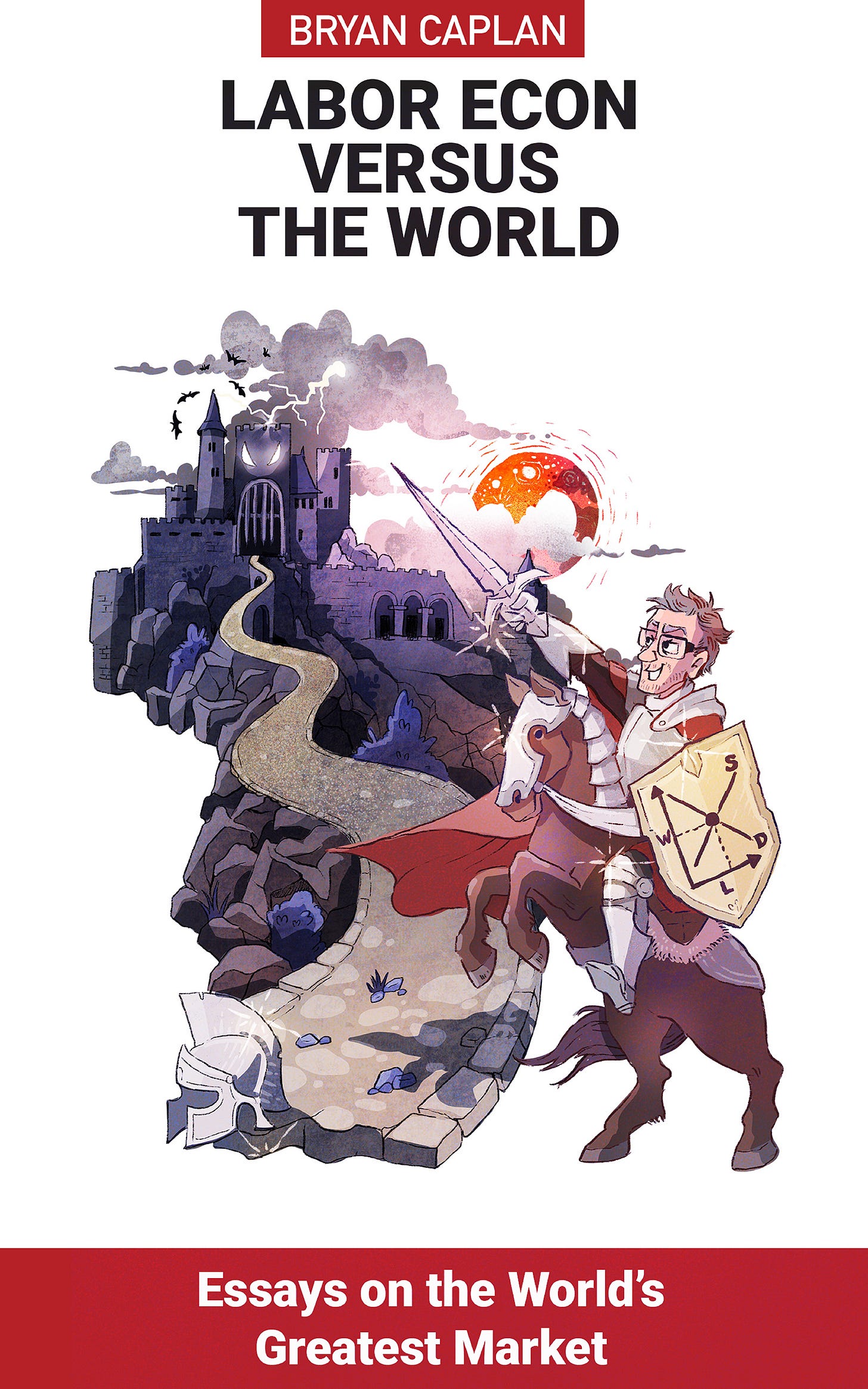
Isn't the best explanation just that Republicans have a distribution about how high the minimum wage should be, that is clustered around $9-10 an hour? Almost all of them favor small increases, and a majority even favor an increase to $11 over the status quo of $7, but when given a choice between $7, $11, and $15, more of them prefer $7 than either of the other two (though nearly as many prefer $11, and even one in six prefer $15).
Democrats also have a distribution of opinions about the minimum wage (about a third prefer $11 to $15, and some even prefer $7), but their distribution seems to be centered somewhere just above $15.
I suspect that if we break down the polling on the basis of party and local cost of living, that for each party, people living in high cost of living areas will be on the higher end for members of their party for what they think the federal minimum wage should be, while people living in low cost of living areas will be on the lower end of the distribution within their party. Given that Republicans tend to live in low cost of living areas, and Democrats tend to live in high cost of living areas, this shrinks the gaps between the parties even more.
The data you have presented here make me think, quite surprisingly, that there is actually very *little* remaining difference of opinion on the basis of party membership, once we factor in where a person lives. Somehow this issue has become much *less* partisan, rather than Republicans turning against it.
"What’s going on? Rising polarization is the obvious story. Mutual animosity is so strong that Republicans will oppose archetypal feel-good legislation like the minimum wage because they know that Democrats support it."
Polarization sure plays a part, but I don't think it is the main reason. What I think happens is that the "feel good" effect depends heavily on the amount of the minimum wage. At $11 workers "deserve it" (even in the Republicans mind) so a) sounds fair and b) is still far away from the amount these voters are earning themselves. $15 on the other hand sounds anti-business and is closer to what this same voters' earn. Afterall, the limit to supporting "feeling good" legislation is that the benefits to the constituency at play allows these underserved, God forbid, to catch-up with the "feeling good" voters.
One of the mysteries of minimum wage legislation is that if people believe the government can set the minimum wage with limited economic consequences, why not setting it at $1,000?
Following from this, I think it would be interesting to see the differences in polling answers if the question is framed in a different light. Something along the lines of: do you think that for teenagers, illegal immigrants and x, y ... workers, the minimum wage should be $11? or do you think that for teenagers, illegal immigrants and x, y ... workers in Alabama, Louisiana and Mississippi (states with a higher percent of minimum wage workers) the minimum wage should be $11? (When polling voters from out of this States)
I am curious about the effect of the "reframing".